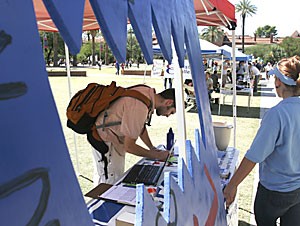Students and national petitioners joined forces yesterday on the UA Mall to try to encourage others to eliminate unfair credit card marketing on college campuses.
At the event, one of 34 that occurred at universities around the nation, students were encouraged to sign a petition supporting the adoption of a policy to limit the number of credit card companies that come to campus and encourage them to provide informational material and fewer gimmicks.
“”It’s something that’s very underhanded from the credit card companies,”” said Angela Yazzie, a freshman majoring in biochemistry and molecular biophysics and a member of Arizona Student Public Interest Research Group. “”They offer you free gifts and in the end they charge you almost triple what you took out. It’s ridiculous and it should be stopped.””
Wearing blue polo shirts adorned with a log that read “”FEESA”” and looked similar to the “”VISA”” logo on many credit cards, petitioners from the U.S PIRG and Education Fund’s national campaign were handing out “”Don’t be a sucker”” lollipops.
They were accompanied by a 7-foot blue wooden credit card monster cut-out that students could stand behind and get their picture taken for a Web gallery.
“”We’re trying to get students to sign a petition to stop credit card malpractices on campus,”” Yazzie said. “”I have family that has gotten into the cycle of getting a credit card for another credit card payment. Obviously I didn’t want that to happen for myself.””
College students graduate with $4,000 of credit card debt, on average, according to truthaboutcredit.org, a project of the U.S. PIRG Education Fund.
Christine Filer, a communication
I’m really glad there’s a group out there trying to
alleviate it.
Christine Filer
communication
freshman freshman
, posed with her head in the mouth of the credit card monster at the event and said she was glad to sign the petition.
“”Credit card debt is a definite problem with college students,”” she said. “”I’m really glad there’s a group out there trying to alleviate it.””
Filer said she’s received more than 15 pre-approved credit cards in the mail, and she immediately cuts them up and throws them away.
“”They make it seem so simple, like it’s a wonderful thing, but it’s really not.””
Tommy Bruce, ASUA president, has also become involved with the PIRG campaign.
“”Universities cannot and should not be handing over the opportunity for students to be cheated and taken advantage of by credit card companies,”” Bruce said. “”Universities should be working hand in hand with credit card companies that meet the requirements and offering opportunities to students to help make college more accessible and affordable.””
Gwen Dungy, executive director of National Association of Student Personnel Administrators, said students use credit cards to fill in the a gap of college expenses, not just for splurging.
“”What (students) can get in loans and what they can get in grants just doesn’t cover the cost of college today,”” Dungy said.
Likewise, Dungy said, the problem is growing because credit card companies have more access to student information through the Internet.
“”There are more avenues of access to students, more then just coming onto the campus and setting up tables,”” she said.
Ed Mierzwinski, consumer program director of the U.S. PIRG Education Fund, said that credit card companies often rely on the fact that students are vulnerable and are impulsive shoppers, which makes it easier to lure students into confusing contracts that switch terms on them.
“”It’s a gateway to get into the students heads and convince them to take on credit they probably don’t need.””









